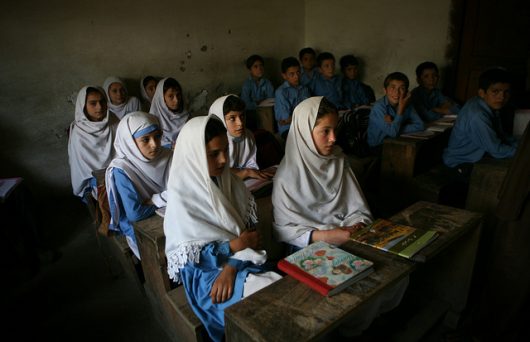USAID Works to Improve Gender Equality in Pakistan

Throughout the years, U.S. organizations and agencies have worked in cooperation with the government of Pakistan and other development partners to establish gender equality in Pakistan. These efforts work to ensure Pakistani women feel empowered to pursue opportunities just as brazenly as their male counterparts.
History: Relations Between Pakistan and the United States
Since Pakistan gained independence in 1947, the United States has provided considerable support in the overall development of the country. The U.S. was one of the first nations to recognize Pakistan as an independent nation.
For more than 60 years, Pakistan and the U.S. have forged a strong, cooperative relationship that has proven to benefit the people of both countries.
Achieving Gender Equality in Pakistan
In recent years, there have been important advancements in gender equality in Pakistan. Today, Pakistani women are more likely to participate in the labor force and access health and educational services than their mothers and grandmothers would have. Pakistan also has a relatively strong women’s political representation — about a fifth of parliamentary seats held by women.
However, there is still significant progress to be made if Pakistani women are to be full partners in the development of Pakistan. Women comprise more than half of Pakistan’s population and yet only 22.7 percent are part of the labor force. Even those who are part of the labor force belong largely to the informal sector, receiving little pay and few legal protections.
Also, while Pakistan enjoys a high gross enrollment rate of 89 percent of girls in primary schools, that rate drops to about 41 percent of girls who are enrolled in secondary schools.
Female Empowerment
The empowerment of women and girls is a critical aspect of any prosperous, democratic society. Female empowerment in Pakistan will not only safeguard human rights but also further international peace and security while establishing a growing, vibrant market economy.
Through the efforts of a combination of many organizations such as the U.S. Agency of International Development (USAID) and the United Nations Development Programme (UNDP) Pakistan is even closer to achieving gender equality.
USAID: The Gender Equality Program (GEP)
The Gender Equality Program (GEP) actively works to diminish the gender gap in Pakistan by supporting women’s economic, political, and social advancement. The program helps women become full and active members of their own society by providing access to information, resources and public services.
The GEP also works to change the derogatory societal attitudes towards women in Pakistan. This program educates women about their fundamental rights at home, at work and in society.
A staggering 32 percent of all Pakistani women have experienced physical violence; 40 percent of married Pakistani women have experienced spousal abuse. Even more concerning, one in two Pakistani women who have experienced physical abuse never sought help.
Through the support of the GEP, local activities are conducted to expand women’s knowledge of and ability to exercise their rights and obtain justice. The GEP helps women’s shelters provide legal aid, counseling and vocational skills that connect women to potential employers.
Empowering Girls Through Education
USAID also has programs such as the Sindh Basic Education Program and the Improving Education Quality Project to ensure more girls have the opportunity to pursue an education. These programs mobilize communities to increase girls’ school enrollment rates and train more female teachers, which encourages Pakistani families to send their girls to school.
USAID also provides scholarships to women pursuing higher education through the Merit and Needs-Based Scholarship program (MNSBP) and the Fulbright Program. MNSBP gifts university scholarships to academically talented, economically disadvantaged Pakistani students.
Major Accomplishments in Gender Equality in Pakistan
Pakistani women have experienced major improvements in regards to gender equality. The USAID has provided shelter, legal, health and economic support to nearly 40,000 victims of gender-based violence while also committing $70 million to help educate and empower over 200,000 adolescent Pakistani girls.
Although, societal beliefs of traditional gender roles may be difficult to break, raising awareness about women’s rights and supporting pro-women laws is a significant step towards achieving gender equality in Pakistan.
– Lolontika Hoque
Photo: Flickr
